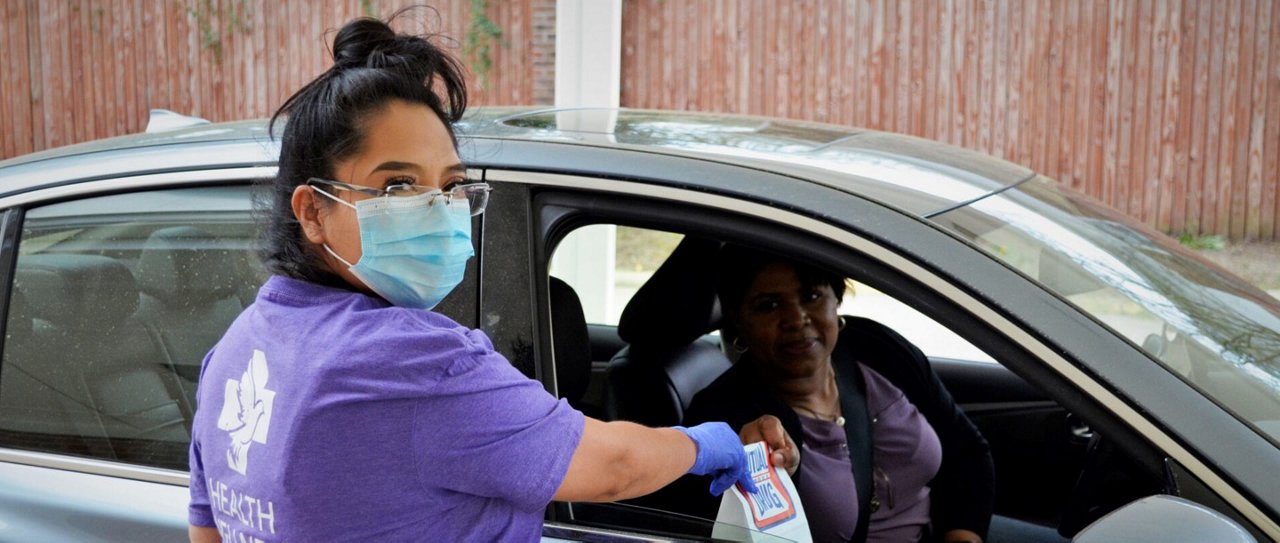Clinic provides care to the uninsured

The COVID-19 pandemic has changed the lives of many, and people who are uninsured are some of the hardest hit. In North Carolina, 20% of adults are uninsured. This population has struggled to keep and find part-time and contract work during the pandemic. And oftentimes, such work does not include employer-provided insurance and disqualifies them from receiving Medicaid.
Alliance Medical Ministry (Alliance) works to fill the gap for those who are employed but without insurance. Since 2003, the non-profit has provided comprehensive and affordable medical care to working, uninsured adults in Wake County. The average patient at Alliance lives at 111% below the federal poverty guidelines and supports a household of three.
Alliance is on the frontlines of the pandemic and has seen the increased need for affordable health care options for the uninsured. Pete Tannenbaum, executive director, and Melanie Rankin, director of development, are helping those in need get low-cost and free health care.
“We provide 2,100 patients with a medical home,” said Pete. “More than half of our patients have a chronic illness or disease and none have health insurance or receive Medicaid.”
Those with chronic conditions are some of the most vulnerable to developing risks linked to COVID-19.
The pandemic has put a strain on Alliance’s operations due to the growing demand for services. To help support Alliance during this unprecedented time, Blue Cross and Blue Shield of North Carolina (Blue Cross NC) invested $60,000 in the organization. The funding is going to support Alliance’s telehealth expansion and infrastructure to continue providing holistic care to its patients.
Telehealth
As one of the first non-profit health clinics in the state to offer telehealth services, Alliance was able to easily pivot to 100% telehealth visits as social distancing began this year. The clinic was designed to safely and remotely deliver medical care.
“We didn’t miss a beat,” said Pete. “We adapted through telehealth and created a drive-thru pharmacy. Our patients need care with or without the pandemic.”
Through its telehealth services, Alliance is able to:
- Conduct virtual visits
- Review treatment plans
- Provide prescriptions
- Coordinate referrals
- Offer behavioral health counseling
Since the pivot to telehealth, the clinic has seen significant reductions in the amount of “no show” appointments. It has also received positive feedback from patients who once struggled to make their in-person appointments due to lack of transportation and job demands.
“We will keep telehealth for those who have a barrier to get to the clinic,” said Melanie.

Holistic Care
At Alliance, the doctors treat the whole patient. They look beyond the patient’s physical health and take into consideration factors that shape their well-being. Factors like a patient’s home life, behavioral health and drivers of health at play, help its doctors come up with a holistic treatment plan.
“We have close to 12,000 visits a year that are holistic. We bring specialists onto our campus, provide behavioral health counseling and work with patients on their physical health through classes like Zumba,” said Pete.
Alliance Holistic Services
- Volunteer specialty providers
- Screenings
- Chronic disease management education
- Wellness programs
This holistic approach to wellness empowers patients to best manage their chronic conditions and maintain their overall health. It also helps Alliance decrease emergency room visits for nearly half of its patients and improve the health of 96% of patients.
Alliance is determined to continue giving residents of Wake County access to quality care that improves their health and well-being through this pandemic and beyond.
“The health of our neighbors impacts the health of our entire community,” said Pete.
We agree. That’s why we continue to work with organizations like Alliance to improve access to care for North Carolinians. Learn more about what Blue Cross NC is doing for local communities across the state.
Browse related articles


Blue Cross and Blue Shield of North Carolina does not discriminate on the basis of race, color, national origin, sex, age or disability in its health programs and activities. Learn more about our non-discrimination policy and no-cost services available to you.
Information in other languages: Español 中文 Tiếng Việt 한국어 Français العَرَبِيَّة Hmoob ру́сский Tagalog ગુજરાતી ភាសាខ្មែរ Deutsch हिन्दी ລາວ 日本語
© 2024 Blue Cross and Blue Shield of North Carolina. ®, SM Marks of the Blue Cross and Blue Shield Association, an association of independent Blue Cross and Blue Shield plans. All other marks and names are property of their respective owners. Blue Cross and Blue Shield of North Carolina is an independent licensee of the Blue Cross and Blue Shield Association.


